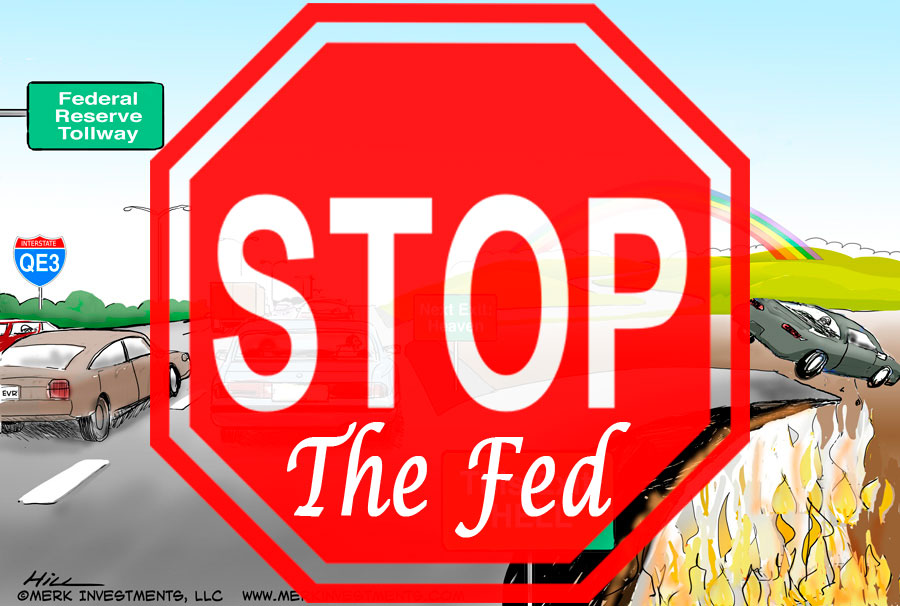Stop the Fed!?
Axel Merk, Merk Investments June 17, 2015 We are concerned the Fed causes both economic and political stability to deteriorate. And, no, this is not about discouraging the Fed to hike rates. This analysis is about pointing out that the road to hell may be paved with the best of intentions. For the economy to prosper, we need a re-thinking not just at the Fed, but also with some Fed critics. Let me elaborate... What’s wrong? Central banks have been ever more engaged in the markets. More than seven years after the onset of the financial crisis, we are still arguing whether we can afford interest rates above 0%. Asset prices have been inflated, benefiting those with assets, but doing little for the working man and woman. Governments from the U.S. to Europe and Japan appear to ever more rely on central banks to provide them with cheap money to keep their deficits sustainable (at zero percent interest, at least in theory, any deficit appears sustainable!). Generally, when asset prices are distorted, we are all but certain to get capital misallocation. This isn’t simply bad for investment managers that chase the Fed rather than invest on fundamentals- it can also be bad for real investments, as it is difficult to discern what real projects are worth investing in. The easy money can also be bad for the social fabric of nations. Without rambling too much about the socio-economic implications of extraordinarily low interest rates, in our assessment, the rise of the Occupy Wall Street movement; the rise of the Tea Party; the success of Abenomics; as well the success of various populist parties in Europe are all a byproduct of monetary policy that’s gone astray. Central banks may not be solely responsible for all the ills of the world, but they have played and continue to play a catalyst. Many may be thankful for the Fed to have “saved the day” in 2008, but the Band Aid approach imposes a heavy toll. The Fed must get out of politics The Fed’s role has expanded vastly over time; be that by adding a full employment mandate in the 1970s; be that by adding responsibilities for consumer protection; or a mandate for overall financial stability. One doesn’t need to be an expert in central banking to have realized that the Fed isn’t particularly good at most, if not all, of these tasks. At the same time, the more dysfunctional a government appears to be, the higher the expectations rise for the central bank; we have seen this in the U.S. since the onset of the financial crisis; in Japan where the Bank of Japan plays a key part of ‘Abenomics’; or the Eurozone where European Central Bank (ECB) President Draghi had to ‘promise to do whatever it takes.’ What about going back to basics. In reverse order of the below list outlines how radical one might want to be. Let me say that by describing them I am not necessarily endorsing any of these initiatives. Eliminate the Fed (and central banks altogether) Eliminate fractional reserve banking Re-introduce a gold standard
Eliminate the Fed’s ability to make fiscal decisions Have the Fed solely focused on inflation If the mandate were clear, it would be easier to communicate, easier to implement. Oh, and should one mention that low inflation when oil prices fall isn’t necessarily bad (Sweden’s central bank has of late been heavily leaning on that excuse to keep rates low). A sole focus on price stability isn’t perfect, but should go a long way towards allowing price discovery to take place with fewer distortions, if combined with a ban for the Fed to make fiscal decisions. Hold the Fed accountable All of these ideas have one thing in common: simplify monetary policy, realize its limitations. Why is any of this important? To continue this discussion, please register to join us for an upcoming webinar. If you haven’t already done so, ensure you don’t miss it by signing up to receive Merk Insights. If you believe this analysis might be of value to your friends, please share it with them. Axel Merk Axel Merk is President & CIO of Merk Investments  Follow @AxelMerk Tweet Follow @AxelMerk Tweet
|


